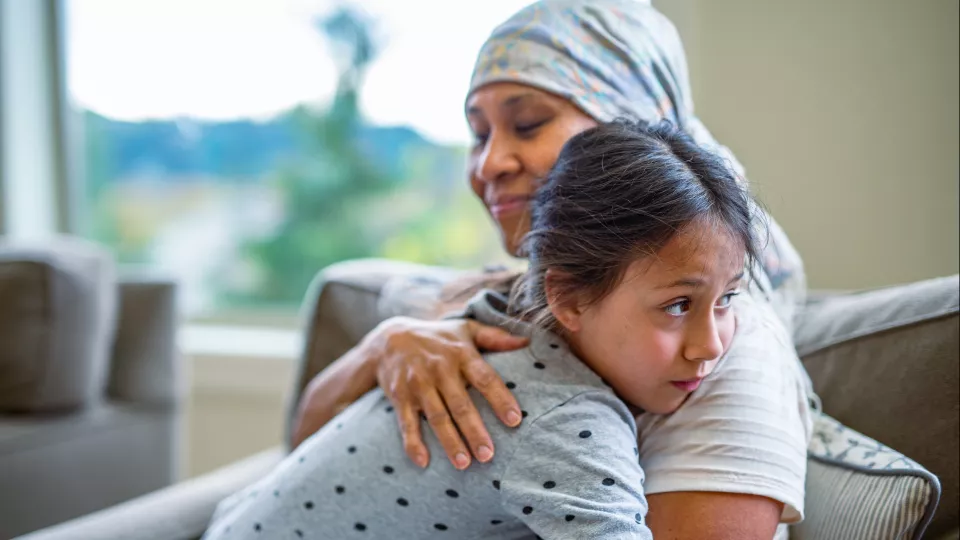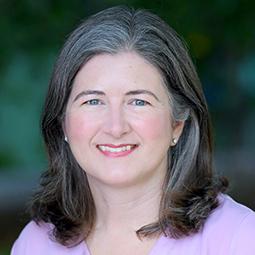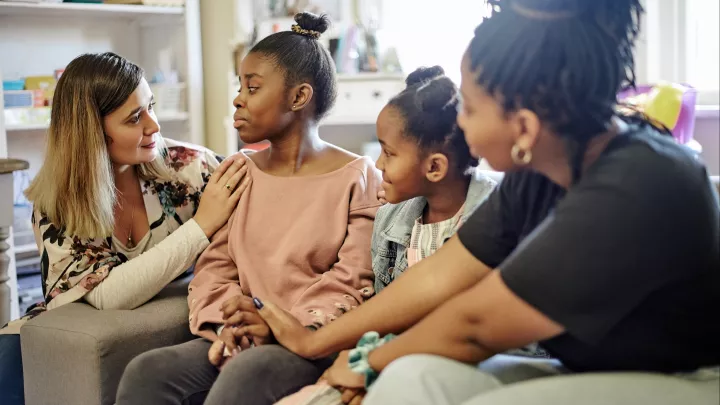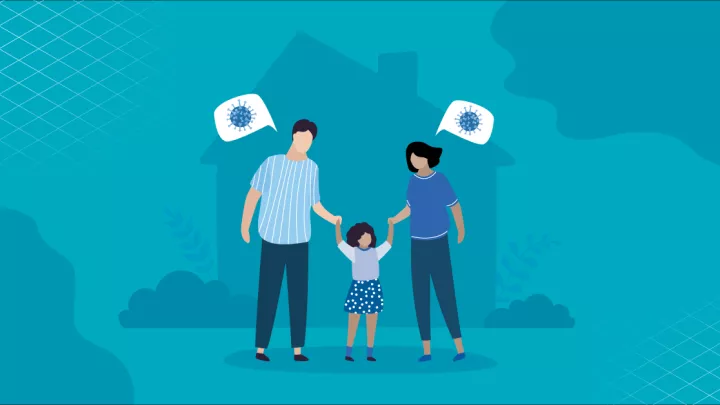
How to Talk to Your Child About Cancer in a Loved One
Key takeaways:
- Be truthful and don't hide things from kids.
- Speak to them in language that is appropriate for their age.
- Let them know that it's OK to feel emotional and encourage them to express those emotions.
- Provide reassurance and let them know there are adults in their lives who are there to help them.
The American Cancer Society estimates that roughly 2 million people in the U.S. are newly diagnosed with cancer each year. That means about 1 in 3 Americans will develop cancer in their lifetime—and there’s a good chance the disease may affect, or has already affected, someone close to you and your child.
If someone you love is facing a cancer diagnosis, you may have already started wondering how best to talk to your child without scaring or worrying them.

Kathleen Ingman, PhD, ABPP, is the Director of the HOPE Behavioral Health, Neuropsychology, and Education Service at Children’s Hospital Los Angeles. The program’s psychologists provide patients and their families with psychosocial support and education while receiving care through the Cancer and Blood Disease Institute. A large part of that work is not only talking to families about how to discuss a child’s cancer diagnosis, but also providing support to the patient’s siblings and family members.
“As adults, when we hear the word ‘cancer,’ it’s a loaded term. It's really scary,” says Dr. Ingman. She explains that children, however—particularly younger children—don't necessarily have pre-existing ideas or emotions associated with the word.
“We have an opportunity to tell kids very accurate, factual things about cancer,” adds Dr. Ingman. “If we have to talk about the scarier aspects, what we say can help them understand in a way that has a very different emotional impact.”
Learn more about the approach that Dr. Ingman and CHLA psychologists recommend when talking to your child about cancer in a loved one.
Dr. IngmanWe have an opportunity to tell kids very accurate, factual things about cancer. If we have to talk about the scarier aspects, what we say can help them understand in a way that has a very different emotional impact.
Plan ahead.
Plan what you’re going to say to your child before you sit down with them. Dr. Ingman recommends using accurate words, like “cancer,” including the specific type of cancer, “chemotherapy,” and “radiation,” to help them develop a vocabulary around the topic and ensure they’re not confused when they hear these words later.
Write down what you plan to say and practice if necessary. Use a calm and reassuring voice when talking with them. It might also be helpful to bring another person with you. This could be another family member or a member of the treatment team.
Be truthful.
You may feel like you’re protecting your child by not telling them about a loved one’s illness, but Dr. Ingman urges parents to avoid lying or withholding a diagnosis from a child. Children are very perceptive and will likely sense that something is wrong anyway. Withholding information from them might cause them to develop an inaccurate understanding of what’s going on or internalize even greater fears.
“We need to give kids the opportunity to be a part of the conversation,” says Dr. Ingman. “Include them in the experience and whatever the rest of the family is going through. That way, everybody can get the support they need.”
Start simple and let your child guide the conversation.
“Usually, if you start with a simpler explanation and your child asks questions, it means they're ready to hear more information,” explains Dr. Ingman, encouraging parents to let the child be the guide.
“If they hear the information and they're not curious about it or want to go back to whatever it was that they were doing, that might be all they can take at that time.”
If they are curious, expect to hear questions about how your child’s routines might change. “Children often want to know very concrete, practical things at first,” explains Dr. Ingman, “They might ask you questions about who will drop them off at school or take them to gymnastics.”
This conversation will likely not be a one-time event—your child may approach you later on with questions. Just like adults, they need time to process what they’ve just learned. Be sure to watch for signals or questions that indicate they want to talk about it more.
Dr. IngmanChildren often want to know very concrete, practical things at first. They might ask you questions about who will drop them off at school or take them to gymnastics.
Don’t expect to have all the answers.
It’s completely normal if you don't know the answers to some questions your child is asking. If a question stumps you, try answering with something like, "That's a good question, and I don't know the answer. I'll try to find out more about that and then I’ll tell you."
Normalize strong emotions—and provide reassurance.
Share your feelings with your child and encourage them to share theirs.
Dr. Ingman encourages parents to remind their children that it’s OK to be nervous, scared, or sad—but that it’s not their job to worry about their loved one. Try saying something like: “It's OK to be nervous. I am, too. But there are a lot of adults in your life who are taking care of you, and they're taking care of the person with cancer. You don’t need to worry about it, because we've got other people in charge.”
“Children often try to protect the important adults in their lives, so they might not share all of their worries and feelings with you because they don't want to burden you,” says Dr. Ingman. She suggests connecting them with an alternate adult (a close friend or family member) whom they’d feel comfortable reaching out to.
Help kids feel a sense of control.
Offer your child concrete options to show care for their loved one, to help them feel a sense of control over the situation. This could be as simple as making a card, calling the person, bringing them flowers, or cooking them a special meal.
Set expectations around when and when not to include kids in care conversations.
There may be larger conversations about a loved one’s care that aren’t appropriate for a young child to be part of, but it’s still possible to make them feel included. Reassuring your child that you aren’t keeping secrets from them might be as simple as saying, “We’re going to talk about some boring grown-up stuff right now about doctors and medicines. We’ll tell you about it later if you’re curious.”
Plan your conversation based on your child’s developmental level.
Children of all ages should know:
- The part of the body where the cancer is located, the name of the cancer
- How their own lives may be affected
- How it will be treated, and the name and description of the treatment (i.e., “chemo or chemotherapy is a special name for a very strong medicine”)
- What has changed about the person (i.e., hair loss, scars, mobility, energy)
- What they might see during a hospital visit (i.e., tubes, machines)
- That they can play an active role in their loved one’s care and treatment
Ages 3 to 7:
- Be factual but use simplified explanations.
- Don’t avoid the word “cancer” or the name of the condition.
- Reassure children that they are not responsible for the cancer—even if they don’t ask.
- Example: “Uncle Tommy is sick. He has a cancer that is called lymphoma. It is making him feel bad, but there are very good doctors taking care of him.”
Ages 7 to 12:
- Kids this age are capable of understanding a more detailed explanation of cancer and its treatment.
- Encourage them to talk to you if they have questions.
- They may hear messages about cancer from other sources (school, friends). Assume that they may have heard that cancer can cause death and provide reassurance even if they don’t bring it up.
- Reassure them that a team of doctors is working to help your loved one.
- Example: “Uncle Tommy has lymphoma. It’s a type of cancer that causes sick cells to grow fast. He will have to undergo a series of chemotherapy treatments.”
Teenagers:
- Teens can understand a more complex explanation of cancer and may have many questions.
- They may be worried about the future and the possibility of death.
- They may seek information on their own from the internet or social media, and this information might not be accurate.
- Example: “Uncle Tommy was just diagnosed with lymphoma and will need a treatment called chemotherapy. If you’re up for it, we can visit him or provide support.”
Seek support for you and your child.
No matter how prepared you are, talking to kids about a cancer diagnosis can still be overwhelming. Reach out to your treatment team to learn more about support services and resources available to you.


